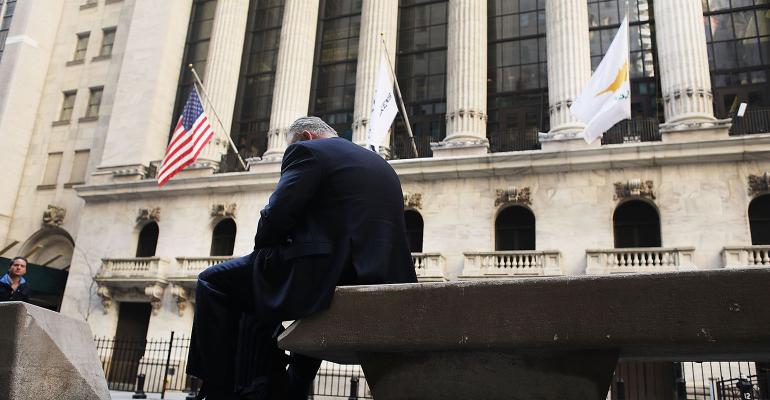By Max Abelson
(Bloomberg) --On the first day of May, Donald Trump sat in the Oval Office and declared that his administration was taking a look at breaking up Wall Street’s biggest banks. If they ever took him seriously, it didn’t last.
Instead of cowering, Wall Street executives and lobbyists are crowing, getting more confident about ditching rules that have annoyed them for years. That’s because the Trump administration is appointing friendly regulators and signaling it will make life easier for bankers.
“Break up the banks? That ain’t going to happen,” said Rick Hohlt, who has advised and lobbied for lenders including Citigroup Inc. for three decades. “You need legislation to do that. And the chance of that is about zero.”
Two weeks after Trump’s threat, Wall Street’s hopes are high. The biggest U.S. banks want him to relax capital requirements that limit their leverage, lighten up on stress tests designed to help them survive another crisis and weaken the Volcker Rule that stops them from placing speculative bets -- something the administration is already taking steps to do.
21st Century
Their confidence doesn’t stop there. Some executives think that if the White House really does push for a sequel to Glass-Steagall -- the 1933 law that separated commercial and investment banking and was partly repealed 66 years later -- the new version would just scrap rules for smaller banks without breaking up large ones.
Since taxpayer bailouts saved the financial system from toppling in 2008, some of the nation’s biggest banks have grown even bigger. JPMorgan Chase & Co. and Bank of America Corp. now have more than $2 trillion of assets each, and Wells Fargo & Co. isn’t far behind. Even Citigroup, which received the most generous bailout, still wields about $1.8 trillion.
Trump, Treasury Secretary Steven Mnuchin and economic adviser Gary Cohn have all endorsed a “21st century” version of Glass-Steagall without explaining what they mean. In the interview this month, Trump told Bloomberg News that bank breakups were under consideration. “I’m looking at that right now as we speak,” he said.
Tim Pawlenty, who runs the Financial Services Roundtable, a Wall Street lobbying group, doesn’t think the administration is really talking about Glass-Steagall when it refers to it.
“Following the president’s remarks on the topic, Gary Cohn clarified the administration’s view of a modern-day Glass-Steagall is a two-tiered approach to regulation in which smaller banks would receive some regulatory relief,” said the former Minnesota governor, whose group represents banks including Bank of America, Citigroup and JPMorgan, the firm that spun off Morgan Stanley because of the original law.
Diced Up
Executives at three of the six biggest banks were on the same page, saying they’d be happy if Trump loosened rules for smaller lenders and sold it as a new and improved Glass-Steagall. It would be a nicer fate for those institutions than getting diced up or having to ring-fence consumer banking from trading operations.
On the same day Trump made his breakup threat, Sean Spicer, his spokesman, said a 21st century Glass-Steagall would allow smaller banks to “spend less time complying with unnecessary requirements.” A spokeswoman for Cohn said he supports tailoring regulation according to bank size.
But Wall Street’s biggest firms also want Trump to roll back regulations that bother them. High up on their wish list is Volcker, the rule in the 2010 Dodd-Frank Act that limits how they trade with their own money and invest in private equity and hedge funds.
On May 8, at a meeting behind closed doors in Washington, Mnuchin told five regulatory agencies to reexamine what’s allowed under Volcker, according to two people familiar with the sit-down. It was a step that could give banks the flexibility to trade without getting into trouble. Banks also want the stress tests required by Dodd-Frank to be easier and less frequent. Trump said this year he expects “to be cutting a lot out of Dodd-Frank.”
Friendly Regulators
Bankers know it won’t be easy to gut that law in Congress, where House Financial Services Committee Chairman Jeb Hensarling’s Financial Choice Act is facing resistance from some members of his own party. But they’re confident friendly appointees will relax rules even if Congress doesn’t change them. Mnuchin, his counselors Justin Muzinich and Craig Phillips, Securities and Exchange Commission Chairman Jay Clayton, acting Comptroller of the Currency Keith Noreika and Randy Quarles, said to be Trump’s pick for top regulator at the Federal Reserve, have all worked at big banks or for them.
The shift from clashing with regulators to working with them isn’t lost on lobbyist Sam Geduldig, a partner at CGCN Group in Washington, whose clients include Goldman Sachs Group Inc.
“This is night and day,” the former top aide on the House Financial Services Committee said. He added that the industry always takes a president’s words on big issues seriously but there’s been no appetite on the Hill for reviving Glass-Steagall.
Wall Street’s critics won’t be shocked if Trump ends up deregulating banks after dangling the prospect of breaking them apart. Art Wilmarth, who teaches banking law at George Washington University Law School, thinks investment and commercial banking won’t be divided before another fiasco hits.
“It’s going to take another significant disruptive event, which could lead people to think, ‘Oh gosh, we really have to do something to control the risks,’” said Wilmarth, who was a consultant to the Financial Crisis Inquiry Commission. “I hope it won’t be another full-blown crisis.”
--With assistance from Dakin Campbell, Yalman Onaran, Laura J. Keller, Elizabeth Dexheimer, Jesse Hamilton, Ben Bain and Robert Schmidt.To contact the reporter on this story: Max Abelson in New York at [email protected] To contact the editors responsible for this story: Peter Eichenbaum at [email protected] Robert Friedman, David Scheer





